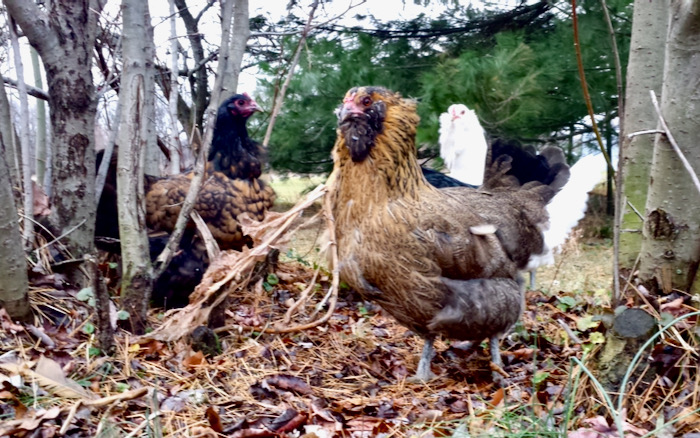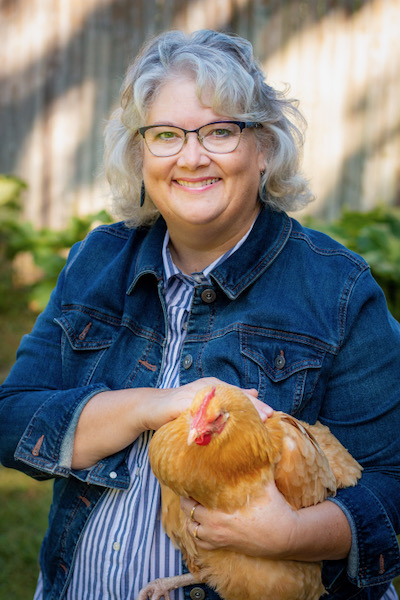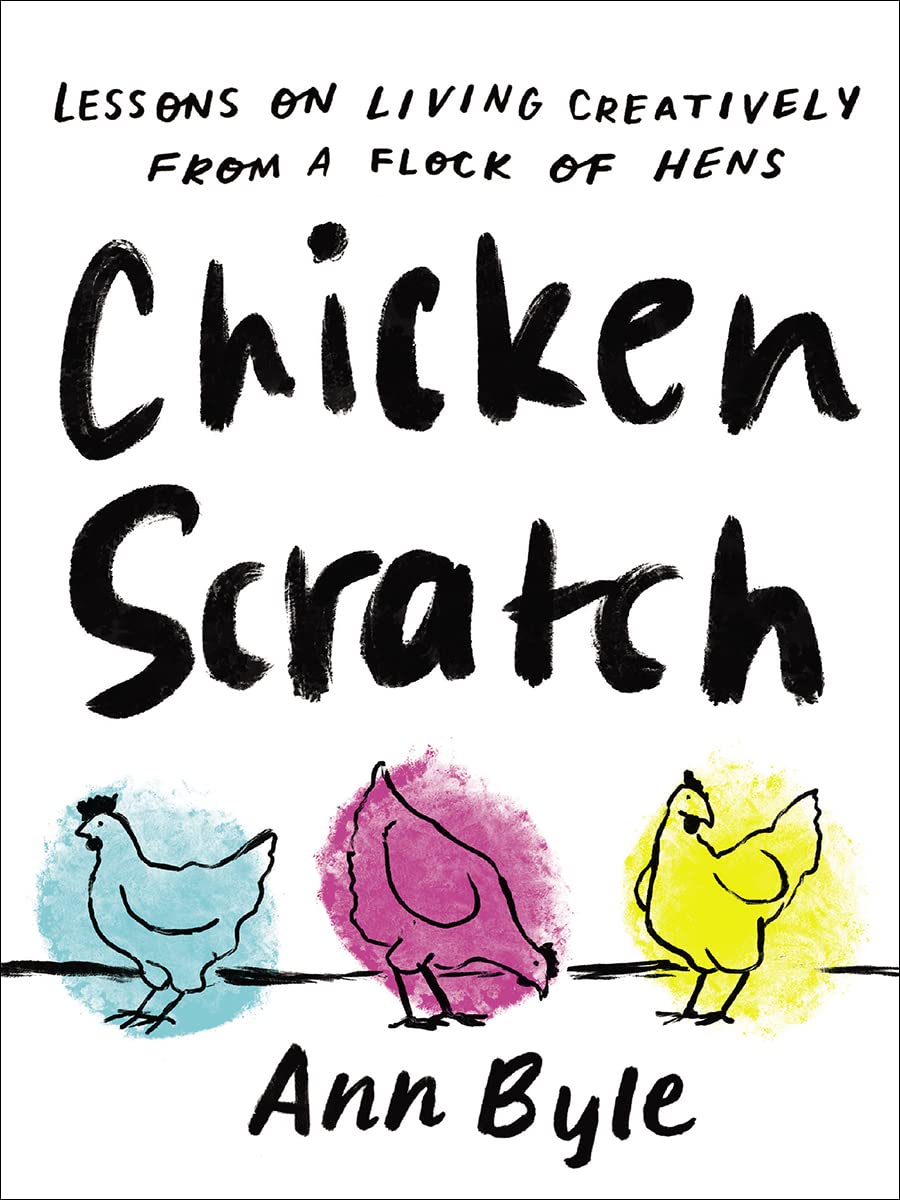Are you ready to take the next step in your creative life?
By DAVID CRUMM
Editor of ReadTheSpirit magazine
What’s your role in the flock?
One thing I’ve learned from watching the chickens raised in our family is: Some may look alike but chicken personalities vary widely, so we can’t always anticipate what they’ll do. Chickens can surprise us; people can surprise us; and we can surprise ourselves. That’s one of the helpful insights in journalist Ann Byle’s new book, Chicken Scratch: Lessons on Living Creatively from a Flock of Hens.
A second helpful insight—and one I’ve taught myself in seminars and workshops through the decades is this: If you want to create—then create. You’re not a writer unless you write. If you want to be a good writer, you’ll write something every single day. And, in a wide variety of ways—sometimes funny and sometimes downright blunt—that’s another essential lesson in Byle’s book.
As simple as it sounds, that’s the first step toward a creative life: You have to start creating and, as Ann puts it, as you start, “Don’t worry about mistakes.” If you’re counting with me, that’s a third valuable “take away”—the creative life involves lots and lots of mistakes. Don’t be discouraged by disappointments; they’re part of the process. Keep going!
So, at this point, you probably realize a fourth important truth about this book: This is not guidebook on how to raise chickens in your yard. This book is about how a nationally known journalist and expert on creativity drew practical and sometimes surprising lessons from the chickens in her backyard. When you open her book, she’s up-front about her goals:
My dream for Chicken Scratch is that it inspires you to take the next right step in your creative life, and to move ever forward. It could be a new casserole recipe, a gorgeous oil painting, a better way to perform a lifesaving surgery, a new piece of music, a new children’s book. The world needs your creativity, needs your dreams, needs the very thing you dream of doing. Please, go forth and create—and maybe my little coop will inspire you as they have me.
How do we know that Ann Byle has authority in these areas?
Although her byline may not be a household name, she is well known in our professional field of publishing about religious and cultural diversity. Her substantial background as a journalist includes regular reporting for Publishers Weekly (PW) magazine about new books coming out on faith, spirituality and religion. She’s a media veteran who understands what’s popular with readers in this genre that rests primarily on inspiration: Will readers walk away from books feeling better than when they started reading?
As you read Chicken Scratch, you’ll realize that Byle has carefully planned each of her short chapters so that they are packed with ideas, questions for reflection, practical tips and even lists of other resources she recommends.
If you want to explore the creative capacities in your life, this is a book-length toolbox you’ll be pleased to own and open.
‘Touch-points on Faith’
Because I have never raised chickens myself, I invited my son in law, the Rev. Joel Walther, who directs the office of human resources for the United Methodist church in Michigan, to read Byle’s book and help us with our Zoom interview. Before his pastoral career began, Joel had managed a farm in Maine and, during his first years in ministry, he raised chickens in the backyard of the parsonage.
“I think this book is a delightful way to reflect on creativity from the perspective of chickens,” Joel said as we began our conversation with Ann on Zoom. “As I read your book, I found myself thinking about my own chicken stories from the years we raised chickens. Then, as a pastor, I also appreciate the touch-points on faith throughout this book. At one point, you remind us that Peter’s symbol became a rooster, because he denied that he knew Jesus three times before a rooster crowed. You also remind us of the famous passage in the Gospels when Jesus says he wishes he could gather his people under his wings like a mother hen.
“So, yes, I really enjoyed this book,” Joel summed up. “Chickens are a great place to jump off into lots of learning and teaching opportunities.”
“I very much agree,” I said. “And one of the most important lessons you draw in the book is that, like raising chickens or any livestock really, this requires daily practice. You can’t occasionally dabble in raising chickens or any other animals, right? It’s a daily commitment. And you can’t fully develop a creative pursuit without discipline.”
“I’m glad you’re pointing this out. It’s so important,” Ann said. “Way too many people don’t take their creative endeavors seriously enough. For example, people think of writing as a gift that’s always waiting—like a faucet that you can turn on any time and these things just flow out of you. Yes, writing may be a gift that you have, but you have to treat that gift seriously. You have to work at it.”
“It’s one of the first things I teach in classes about writing,” I told Ann.
She nodded across the Zoom screen. She said, “Having worked for a newspaper for many years, we learn that you don’t have the luxury of only writing when you feel like it.”
“I like the way you explain the challenges—and the mistakes we’ve all made along the way,” Joel said. “Raising chickens isn’t like raising a puppy. We’ve done both and we know. Chickens are different.”
“You’re right,” Ann said. “Chickens are livestock. The goal with chickens is not to have them curl up with you on the couch. They’re quite independent. They can fend for themselves most of the time—but you’ve got to pay attention everyday.”
“And sometimes there are setbacks, even tragedies,” Joel said. “I remember when we lost our first chicken because it literally chose to cross the road in front of our house. The other chickens did learn to avoid the road, after that, but there are lots of challenges—from cars driving by to predators that eat chickens. This is quite a commitment.”
“It is,” Ann said. “Chickens want to do their own thing, but every day you’ve got to be sure they’re safe and warm and have water and food. In the great scheme of things, chickens are not terribly difficult to raise—but you quickly learn that what you get out of raising chickens depends on what you put into this on a daily basis. And the same it true of creativity.”
‘Plus, this is just fun.’
Both Joel and Ann, who is active in her own congregation, said they can see this book as popular with small groups, perhaps discussing parts of the book over a series of weekly sessions. Those discussions could be within congregations—or in secular settings like a local library. Ann’s expressions of her faith in some passages of the book are within the context of a larger community conversation.
“I definitely could see people discussing this book in small groups—because it fits with a theme I always emphasize,” Joel said. “One thing I try to teach in my own community, especially in my church, is creativity. So for me this book is a perfect marriage of what I know about raising chickens and the challenges of the creative life. Plus, this is just fun—this book is fun.”
Ann said, “Churches would do well to have more fun and I appreciate that about my own church now—we do know how to have fun sometimes.”
We all agreed that one of the first reactions people will have to Chicken Scratch is: A big smile.
You will learn a few things about fostering creativity. You’ll feel encouraged if you already are a creative person. You’ll learn a lot about chickens. And, when you’re done, you’ll have a list of creative ideas to explore and lots of other recommended books to consider reading next.
“I hope people walk away inspired to tap into that dream they’ve always had,” Ann said at the end of our Zoom conversation. “It doesn’t have to be a big dream. It doesn’t have to be writing a whole novel or painting a big painting—but everybody has something that they love and they wold love to do more often—or they would like to start. Even if it’s just putting a new spice in a recipe or using a different kind of yarn when you’re knitting, I hope they come away from this book with the courage to try something new and creative.”
.
Care to learn more?
GET THE BOOK: It’s available in hardcover and Kindle versions from Amazon.
VISIT ANN ONLINE: The best starting place is her website, AnnByleWriter.com. Many of our ReadTheSpirit readers are professionals and community leaders who are looking both for fresh ideas as well as the work of other talented professionals. If that sounds like you, then don’t miss the section of Ann’s website labeled AB Writing Services, where Ann outlines the many professional ways she has worked with clients over the years. You might want to remember her, if you or your community group needs a professional writer or editor. You might also want to take a look at her Events page, which includes a box you can use to sign up for her free newsletters.
LEARN MORE ABOUT THE SPIRITUALITY OF THE NATURAL WORLD: Our online magazine regularly publishes stories about the connections between faith, spirituality and the natural world. In a May Cover Story, we featured popular author Barbara Mahany talking about her new release, The Book of Nature. If you are interested in Ann Byle’s book, we can guarantee you’ll also enjoy Barbara Mahany’s writing.



